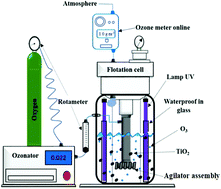Intensification of the O3/TiO2/UV advanced oxidation process using a modified flotation cell†
Abstract
The present work reports the use of a flotation cell as a prospective reactor for ozonation and the intensification of ozonation (catalytic ozonation and photocatalytic ozonation). The effect of the pH, ozone concentration and loading catalyst was investigated. The performance of the flotation cell was compared with that of conventional reactors used in ozonation through the ozone utilized index (OUI), which was proposed in this work and relates the amount of ozone supplied to the system per milligram of degraded pollutant. The flotation cell has the lowest OUI, which indicates that the ozone supplied is highly consumed. It was found that the modified flotation cell is an efficient reactor for ozonation, catalytic ozonation and photocatalytic ozonation processes because total diclofenac degradation was achieved in a short time, mass transfer limitations were not found (Ha = 7.26), and it presented a relatively low energy consumption (1.15 kW h m−3).

- This article is part of the themed collection: Solar chemistry & photocatalysis: environmental applications – SPEA10


 Please wait while we load your content...
Please wait while we load your content...